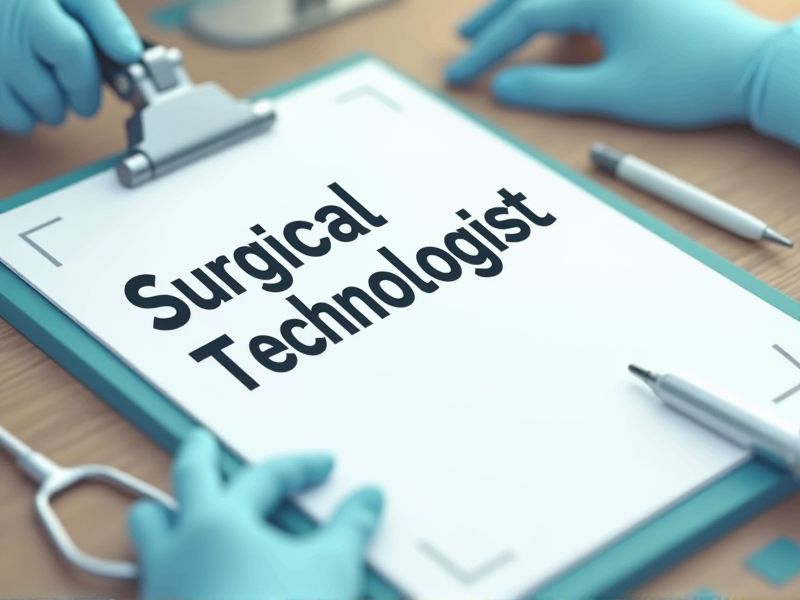
Surgical Technologists play a vital role in the operating room by ensuring patient safety and efficiency during surgical procedures. Certifications validate their skills, reinforcing trust among healthcare teams and enhancing job prospects. These certifications often cover critical areas such as sterilization techniques, equipment handling, and anatomy understanding, all essential for optimal surgical outcomes. Here are some important certifications you may need as a Surgical Technologist.
Certified Surgical Technologist (CST)
Certified Surgical Technologists (CSTs) are essential for maintaining high standards in operating rooms, as their certification demonstrates a verified level of expertise and competence. The certification process ensures that CSTs are up-to-date with the latest surgical techniques and sterilization protocols, which enhances patient safety. Hospitals and surgical centers often require or prefer CSTs to ensure compliance with healthcare regulations and accreditation standards. Their certified skills reduce the likelihood of surgical errors, thus improving overall patient outcomes and boosting healthcare efficiency.
Certified Operating Room Technician (COT)
Certified Operating Room Technicians ensure adherence to surgical protocols, enhancing patient safety. Their certification demonstrates proficiency in sterilization and instrument handling, reducing infection risk. They facilitate efficient surgical workflows by anticipating surgeons' needs, optimizing procedure time. Their specialized training supports a cohesive team environment, crucial for successful surgical outcomes.
Basic Life Support (BLS)
Basic Life Support (BLS) training equips surgical technologists to act swiftly during cardiac or respiratory emergencies in the operating room, ensuring patient safety. Knowledge of BLS contributes to a team's overall preparedness and confidence, which can improve patient outcomes during critical procedures. The operating environment demands quick and precise response capabilities, and BLS training provides these essential skills. Awareness and skills gained through BLS reduce the response time to emergent situations, potentially decreasing the likelihood of adverse outcomes.
Advanced Cardiac Life Support (ACLS)
Advanced Cardiac Life Support (ACLS) provides surgical technologists with the skills needed to respond effectively to cardiac emergencies in the operating room. This training enhances their ability to support surgeons during critical situations, ensuring patient safety. ACLS knowledge ensures rapid identification and treatment of life-threatening conditions. Equipping surgical technologists with ACLS reduces the likelihood of adverse outcomes during surgery.
Pediatric Advanced Life Support (PALS)
Pediatric Advanced Life Support (PALS) is crucial for surgical technologists because it equips them with vital skills to recognize and respond to pediatric emergencies. Advanced training in PALS enhances their ability to support surgical teams effectively in managing critical situations involving infants and children. In surgical settings, unexpected complications can arise; a trained surgical technologist can assist in stabilizing pediatric patients. Increased proficiency in PALS contributes to a safer operating room environment, reducing potential risks for young patients.
Certified Endoscopy Technician (CET)
Certified Endoscopy Technicians (CETs) bring specialized expertise critical for assisting Surgical Technologists during procedures involving endoscopes. Their certification ensures adherence to safety and procedural standards, minimizing risks of infection and equipment malfunction. This expertise in handling and managing endoscopic equipment allows surgical teams to focus on complex tasks. The presence of a CET enhances procedure efficiency and patient outcomes by ensuring optimal support throughout endoscopic surgeries.
Certified Registered Central Service Technician (CRCST)
The CRCST certification is crucial for surgical technologists as it ensures that they have a thorough understanding of sterilization processes, which directly impacts patient safety. When surgical tools are improperly sterilized, there is a heightened risk of infection, which can lead to complications in surgical outcomes. Certification provides evidence that a surgical technologist is trained to manage and maintain sterile equipment, contributing to a more efficient and reliable operating environment. Hospitals and surgical centers often seek CRCST-certified professionals because they help ensure compliance with industry regulations and standards.
Certified Sterile Processing and Distribution Technician (CSPDT)
A Certified Sterile Processing and Distribution Technician ensures surgical instruments are sterile, which is crucial for preventing infections during procedures. Their expertise in maintaining and tracking equipment availability supports efficient surgical workflows, reducing delays and errors. By managing inventory accurately, CSPDTs help control costs in surgical departments. Surgical technologists rely on CSPDTs to maintain a standard of safety and reliability, enhancing overall patient care.
Bloodborne Pathogens Certification
Surgical technologists regularly handle sharp instruments and are exposed to blood, which increases the risk of encountering bloodborne pathogens. Bloodborne Pathogens Certification provides the knowledge necessary to prevent these infections, ensuring a safer environment. Hospitals and surgical centers often require this certification to comply with OSHA standards, reducing liability and enhancing safety protocols. Certification empowers surgical technologists with skills to implement effective infection control measures, safeguarding patient and personal health.
OSHA Healthcare Certification
Obtaining OSHA Healthcare Certification ensures that surgical technologists are knowledgeable about workplace safety standards, significantly reducing the risk of accidents in operating rooms. Proper certification equips them with skills to handle hazardous materials and sharp instruments, thereby preventing potential injuries. An educated workforce leads to improved patient outcomes, as technologists contribute to sterile and safe environments. Certification adherence demonstrates compliance with legal requirements, fostering trust among patients and employers.
Summary
When you obtain certifications as a Surgical Technologist, your job prospects often improve due to increased qualification. Employers may see you as more competent, leading to more job opportunities or promotions. Certified individuals tend to receive higher salaries compared to those without certifications. Enhanced skills and expertise might also translate into better patient care and surgical outcomes.
